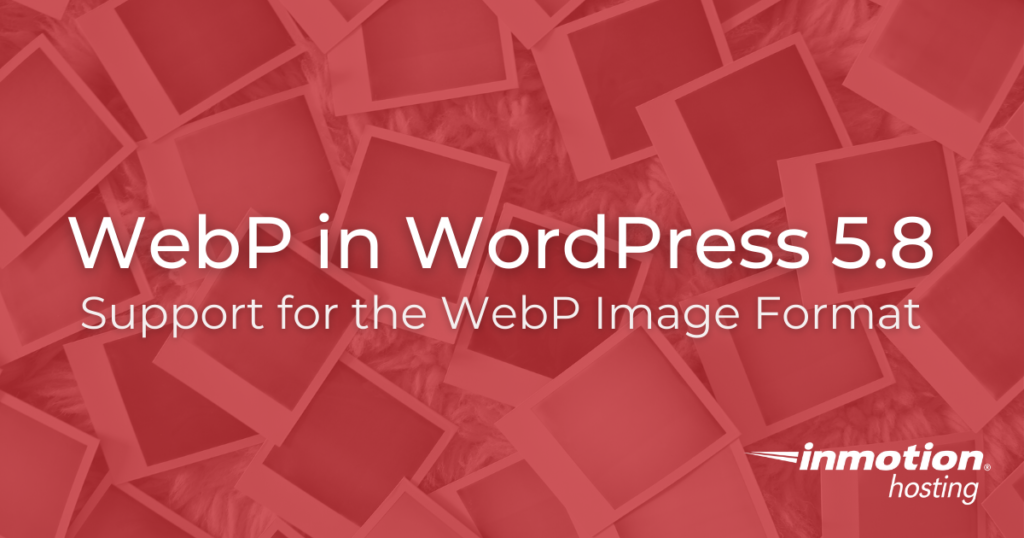
WordPress 5.8, already in beta and set to release July 20th, 2021, will include numerous improvements and new features, including putting WebP in WordPress 5.8. One of the most anticipated changes is full support for the WebP image format. Developed by Google, the WebP format is now widely supported across a variety of browsers, devices, and software. Below, we’ll take a look at exactly what WebP is and explain how WebP in WordPress 5.8 can help you improve your WordPress site’s performance and speed.
- A WebP Overview
- The Purpose of WebP
- Why is WebP in WordPress 5.8?
- Should I Make the Switch Now or Later?
- Switching Based on Browser Compatibility
- Image Conversion and Making the Switch
A WebP Overview
The Purpose of WebP
WebP is an image format. You’re probably already familiar with the more commonly used image formats like JPG and PNG. On any given website, images are usually going to take up more memory than any of the text or code. Readers and creators alike find images engaging and informative, but too many images make the site load slowly. Google developed the WebP format to speed up load times and reduce bandwidth without losing image quality.
In the world of image optimization, decreasing the file size of an image without significantly reducing image quality is a big deal. WebP takes different approaches when converting JPG and PNG image data, but the WebP version of an image is usually reduced in size by around 30%. On an image heavy or high traffic site, this can lead to a significant improvement in load times and bandwidth.
Why is WebP in WordPress 5.8?
WebP has been in development in one form or another for over a decade — why is WordPress only adding WebP support now? The simple answer is that the browser ecosystem did not fully support it. The WordPress team waited for the most commonly used browsers to support WebP before adding it to WordPress. It’s only recently that all five of the most popular browsers — Chrome, Firefox, Edge, Safari, and Opera — began to fully support WebP. Mac and iOS only added support for WebP last year, in Big Sur and iOS 14. Those running older versions of some browsers will need to update their software for WebP images to display correctly.
Should I Make the Switch Now or Later?
Switching Based on Browser Compatibility
There are still two big reasons you may want to wait before making the switch to WebP. WebP works on modern versions of the “Big Five” browsers, but may not work on older, out of date versions. Plus, people browsing the web on older versions of MacOS are out of luck until they upgrade to a more recent build. It all depends on your audience — if your readers are more likely to use out of date, older software, it’s a good idea to wait before making the switch. The other reason to wait? Image conversion!
Image Conversion and Making the Switch
The easiest way to switch to WebP is to just use WebP for all images you post going forward. Image editing utilities like Photoshop already have a built in ability to export photos as WebP. Google’s WebP resources page includes downloadable image converters you can install on your computer. For existing content, you could always go through your site and manually switch every image to its WebP equivalent, but that will be time consuming if you have more than a few images on your site.
The best way to make the switch is to convert existing images an image optimization plugin. Many of the popular image optimization plugins like Smush and Imagify already have WebP tools built in to the latest version of the plugin, available in premium (paid) versions, or available as a separate plugin. Furthermore, plugin developers have recently released a variety of new and specialized plugins focused on WebP image conversion. If you already have a preferred image optimization plugin, you may want to wait until that plugin adds a WebP conversion tool. That way, you can carry out the process using familiar tools you trust.
Improve the performance and security of your WordPress website with our WordPress hosting plans.
Web Application Firewalls
Free SSL Certificates
Advanced Server Caching
View WordPress Hosting Plans


